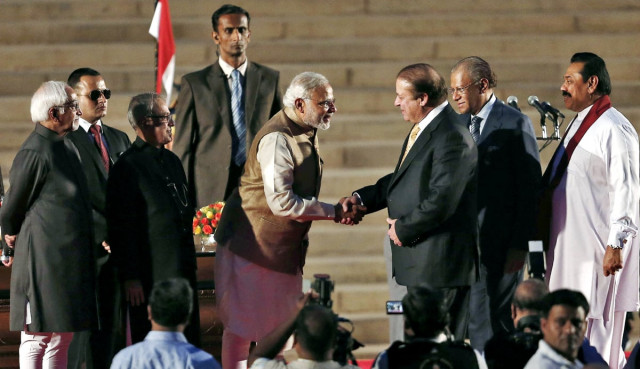Prime Minister Modi’s heavy burden
Pakistan-India should take heed as euphoria witnessed on May 26, will not last long, obstacles will come fast & often.

India's Prime Minister Narendra Modi (2L) is greeted by his Pakistani counterpart Nawaz Sharif (3rd R) after Modi took the oath of office at the presidential palace in New Delhi May 26, 2014. Also seen are India's President Pranab Mukherjee (L), Sri Lanka's President Mahinda Rajapaksa (R), and Mauritius Prime Minister Navinchandra Ramgoolam (2nd R). PHOTO: REUTERS

These are days of great hope not only for Indo-Pak relations but the region at large. While all the talk is about the attendance of Prime Minister Nawaz Sharif, let us not underplay the presence of Sri Lankan President Mahinda Rajapaksa. Sri Lanka and India have also had tumultuous relations, particularly over the last few years over the alleged treatment of ethnic Tamils during and after the bloody civil war in Sri Lanka. The political administration of India’s southern Tamil Nadu state has been vocal about its anti-Rajapaksa stand, so much so that recently, even Sri Lankan cricketers playing for Indian franchises in the Indian Premier League sat on the sidelines for any games played in Tamil Nadu. Mr Rajapaksa’s attendance has already caused controversy with the widely influential Tamil Nadu Chief Minister, J Jayalalithaa, refused to attend Mr Modi’s swearing-in. While such a strong response was expected, Mr Modi and his team thought it better for the Sri Lankan president to be invited. And that seems to be the theme at the inauguration of the Modi era: rapprochement with estranged neighbours.
While many would still remain sceptical about how long this goodwill will last before realpolitik and local compulsions kick in — both in India and in Pakistan — the reality is that, given his large mandate, the new prime minister has the power not to cave in, unlike the two successive coalition-supported Congress governments. And the same is the case with Sharif, who himself noted this in his interview to NDTV. He added that this was a great opportunity to mend relations and to reach out to each other. And he is right. Such a situation is rare — two strong governments with the ability to set their own agendas, one with four years left in their tenure and the other five. Time and opportunity have aligned for South Asia. However, both sides should take heed: euphoria, as witnessed on May 26, does not last long and obstacles will come fast and often; locally and internationally. It is critical that this slipstream of hope is taken full advantage of for the benefit of hundreds of millions of people and to make sustainable and tangible progress.
Like it or not, given its sheer size, economic and global clout, India sets the tone for the region. And such a strong and positive start is encouraging for the neighbourhood. Destiny is reaching out to Prime Minister Modi, and how he responds as the 15th premier of India will be critical for this generation and indeed the next. One thing is for sure: with him firmly in charge of New Delhi, there are chances of a new beginning. That’s a heavy burden to carry.
Published in The Express Tribune, May 27th, 2014.
Like Opinion & Editorial on Facebook, follow @ETOpEd on Twitter to receive all updates on all our daily pieces.



















COMMENTS
Comments are moderated and generally will be posted if they are on-topic and not abusive.
For more information, please see our Comments FAQ